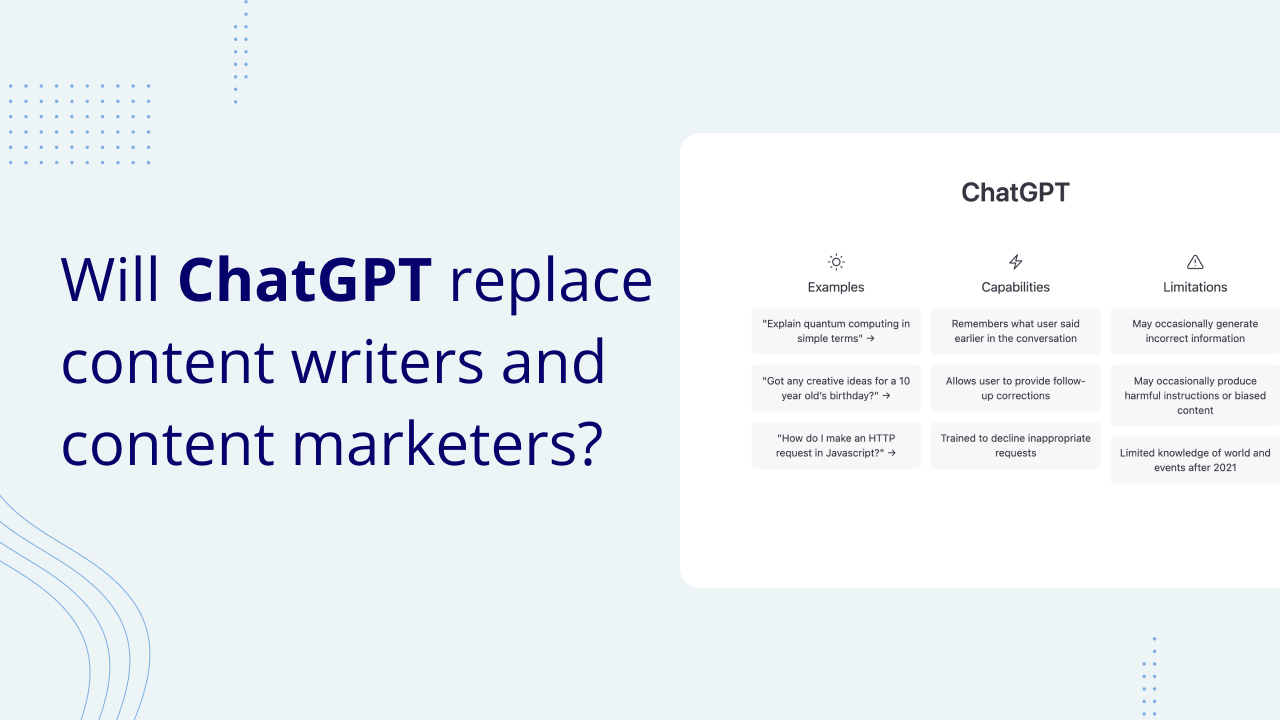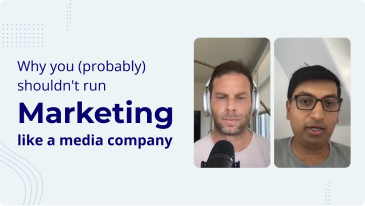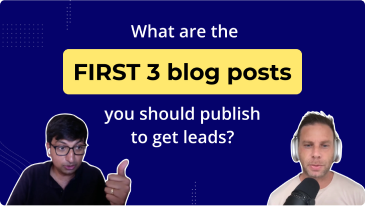Over the last 5 years running our agency and working with a number of different healthcare providers and product businesses, we’ve come to understand that content marketing in the healthcare industry has some unique challenges compared to other industries. Specifically:
- Difficult and technical writing: It’s difficult to find writers that can write clearly and accurately about the technical aspects of healthcare topics (describing concepts correctly, using the right terminology in the right contexts, etc.). At the same time, the consequences of putting out inaccurate information are especially high in the healthcare sector because doing so can severely diminish credibility or even have legal ramifications. So extremely precise yet nuanced writing is essential in healthcare but hard to come by.
- Compassionate selling: The selling of products and services in healthcare content needs to be done thoughtfully and with consideration for readers that are often under duress when searching for solutions to their medical problems. There needs to be a careful balance of educating versus selling that requires finesse to execute well.
- Nuanced SEO keyword strategy: The most effective form of content marketing is that which ranks for search terms that (a) your target audience would actually Google and (b) shows some buying intent for your offering. Executing this well for healthcare is tricky. You need a really deep understanding of customer or patient questions, what those questions indicate about the stage of the process the patient is in, when it’s appropriate to sell your product or service, and more.
Our healthcare clients have often remarked on how difficult it has been to solve these challenges both internally as well as with outside writers and agencies they’ve worked with.
So, in this post, we’re going to discuss how we’ve approached solving these challenges in our work with healthcare organizations and product companies. As usual, we will share examples and case studies from our work to demonstrate and support the methods we discuss.
If you’re in the healthcare or med tech space and looking to build a content marketing or SEO operation, feel free to reach out to us here.
What Is Healthcare Content Marketing?
Before we get into the key challenges below, let’s first define how we think about healthcare content marketing at our agency.
From our perspective, healthcare content marketing is the process of creating content that’s designed to a) reach potential patients or customers, b) help them better understand their health-related problems and answer their health-related questions, and c) share with them how our clients’ products and services can help them solve those problems.
Broadly speaking, healthcare content can include many different content formats: blog posts, infographics, webinars with healthcare professionals, podcast interviews with industry experts, quizzes, video content, white papers, etc.
However, for the purposes of this article, we will focus on search engine optimization (SEO) focused blog content, because that’s what we do at our agency, and that’s fundamentally what many marketers and businesses have in mind when they think about content marketing.
Now, let’s dive into the key challenges of healthcare content marketing we shared above, and discuss how we’ve approached solving them.
Challenge #1: Finding Content Writers That Can Accurately Express Subject Matter Expertise
The ability to express subject matter expertise through content is a critical, but often under-emphasized, aspect of effective content marketing (especially in the B2B space where content is aimed at advanced target audiences). However, this need is taken to the extreme in healthcare content marketing which often involves discussing medical conditions or providing medical advice to consumers, and therefore requires the utmost accuracy from both an ethical and a brand credibility standpoint.
Now, like other industries, finding agencies or writers that have processes to gain and express subject matter expertise through content turns out to be quite hard because it’s common practice in content marketing for writers to self-research topics to produce their articles. This is problematic in most industries, but for healthcare products and services that need to discuss and portray medical-related topics clearly and accurately, it’s simply unacceptable.
Healthcare content must be informed and vetted by subject matter experts within your organization (often doctors, licensed care providers, or scientific researchers).
Furthermore, for most healthcare organizations or companies, it’s important that the views of their care providers, founders, or leadership are expressed, not that of any expert on the topic.
Why?
Because their organization and brand often has a unique process or product to solve a common healthcare problem. That unique twist is almost always extremely important to their brand. It’s why customers should choose them, what they innovated, and how they’re differentiated.
So, the writer or agency can’t just interview some random expert or doctor (for example using a tool like HARO) on a topic. They need to understand the importance of interviewing your company’s employees. Then, they need to be able to deftly craft narratives that accurately express the company’s brand positioning. It’s not trivial to find people who can do this (trust us, hiring writers is one of our biggest challenges).
As an example, our client Cognitive FX (discussed below) built their entire brand and business on a new, cutting edge way of treating concussions. Specifically, they developed a process to identify where in your brain you’re experiencing changes from a concussion, and a multidisciplinary team of doctors and therapists that tailor treatment based on each patient’s individual case. Paired together, what they offer is unlike what anyone else in the world can provide. And content for them will never be right unless the team producing it has a process to get their viewpoint on every piece they write.
The bottom line: If you’re going to do healthcare content marketing, you need to ensure that whoever you hire has a process for gaining and expressing subject matter expertise from inside your own organization for every piece of content they produce.
At Grow and Convert, we solve this by doing in-depth interviews with experts at our clients’ organizations for the articles we write.
To demonstrate what this looks like, let’s walk through an example of our process of writing an article for the healthcare client mentioned above, Cognitive FX (a world-renowned concussion treatment center based in Provo, Utah).
Expressing Subject Matter Expertise in an Article for Cognitive FX
The Target Keyword: “post-concussion headaches”
Each article we produce for our clients begins with a specific keyword that we’re targeting. Below, we’ll share more about how we select and prioritize keywords. But, for the purposes of this example, we’re going to focus on our writing process for a keyword that we’d already selected for Cognitive FX. Specifically, “post-concussion headaches.”
The Interview Preparation Process
Per our SEO content writing process, our content strategist for Cognitive FX, Olivia Seitz, began her interview preparation by reviewing the existing search results for the target keyword “post-concussion headaches” in order to figure out what topics she would need to cover in the article (and therefore ask about during her interview) in order for it to rank.
She read the top articles to see what they were saying and which subtopics they were covering. And she sought to understand the specific questions that patients have around this topic by reviewing queries from “People also ask”:
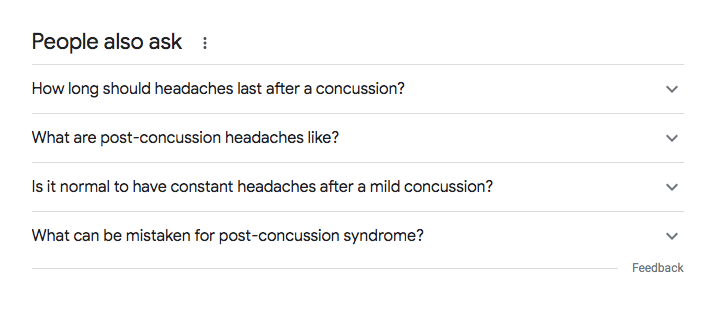
That was one part of her interview preparation. The other part was doing a simple but important thought exercise — putting herself in the mindset of a person that has this problem, and considering their concerns. For example:
- What’s causing this problem?
- What are the different ways that I might experience this condition?
- Do my symptoms line up with the symptom profile for this condition?
- How is this treated?
- What are the treatment options?
- How long does it take to recover?
- Etc. etc. etc.
So, these were the sorts of questions she used to guide the conversation during her interview, discussed next.
Technical Topics Covered in the Interview and Discussed in the Article
For this post (and many others), Olivia interviewed Dr. Jaycie Loewen, a Clinical Neuroscientist whose deep expertise informed many treatment improvements at Cognitive FX. Dr. Loewen explained a number of complex topics during the interview, which Olivia later translated into the article. For example:
- How autonomic nervous system dysfunction leads to post-concussion headaches
- How neurovascular coupling dysfunction contributes to post-concussion headaches
- Vestibular issues that can lead to headaches
Had Olivia tried to self-research concussion headaches, or interview some random neurologist about this topic, she almost certainly would not have even come across these topics or this terminology.
Other top ranking posts she likely would have read, such as posts by Mayo Clinic, Cleveland Clinic, or WebMD, say nothing of these specific types of headaches. It was only by interviewing Dr. Loewen that these subtopics came up.
This is what gave the article more depth, and led it to ranking in position #1 for the target keyword (as well as many other keywords) for several years.
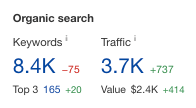
Data from Ahrefs showing this post ranking for a cool 8.4K organic keywords with 165 in the top 3 positions. This type of reach, compounded over many articles, has led Cognitive FX to become a true thought leader in their space (as they deserve to be, given their unique approach to treating concussions).
Unique Insights Gleaned From the Interview That Differentiated the Article and Made an Impact on Readers
Because Dr. Loewen had extensive, direct experiences talking to patients on a daily basis about their concussion symptoms, she had a much more nuanced and detailed understanding of how post-concussion patients experience (and importantly, describe) headaches than what any existing articles on this topic were discussing.
For example, one unique concept that came out during the interview was the common ways in which headaches feel different to different patients. Dr. Loewen was able to break down and categorize post-concussion headaches into six different types of headaches which, remarkably, can sometimes be linked to what might actually be causing the headache. This gave us a whole new layer of information that none of the existing articles on this topic at the time were acknowledging or discussing.
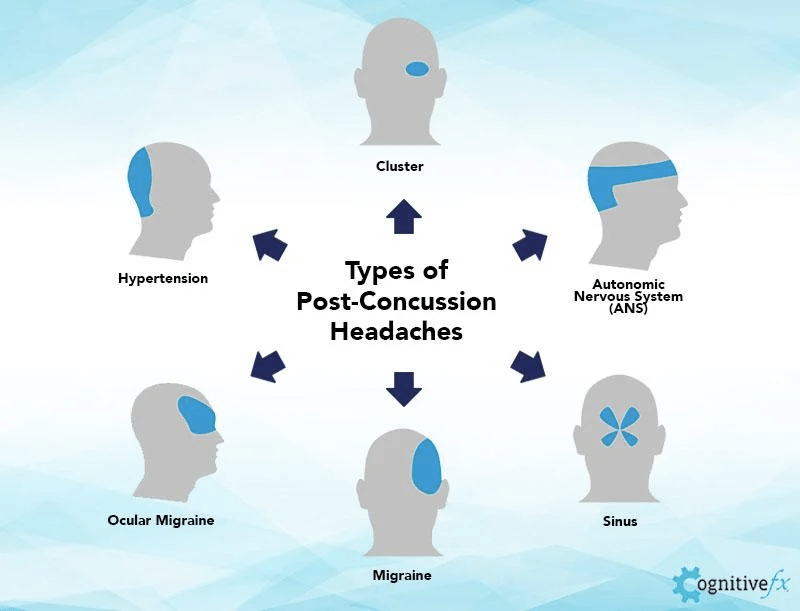
Furthermore, she was also able to share the exact words and phrases that her patients use to describe their headaches, which can make an article really resonate with the searcher.
- “I feel like there’s a tight band around my head.”
- “My head feels like it’s blowing up like a balloon.”
- “I have a constant pressure headache.”
- “I feel like my head is being pulled apart between the eyes.”
In the first paragraph of the piece, we opened with these phrases about how Cognitive FX patients describe their concussion symptoms:
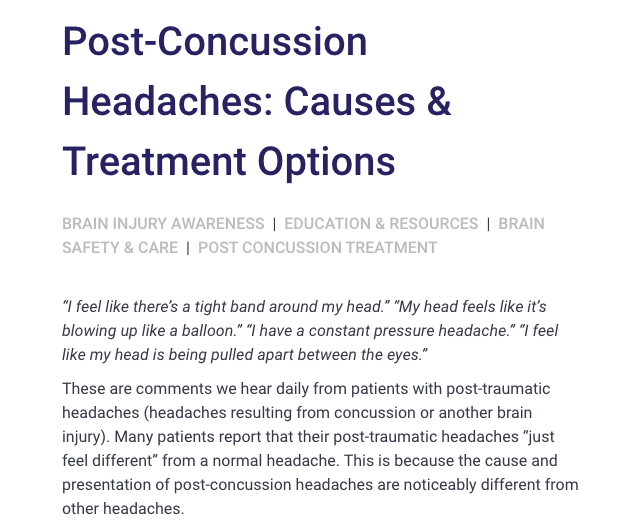
This ended up having a profound effect on the article’s ability to resonate with readers (and, downstream from that, produce many leads for CFX as we’ll show below). Just look at this comment left by one reader:
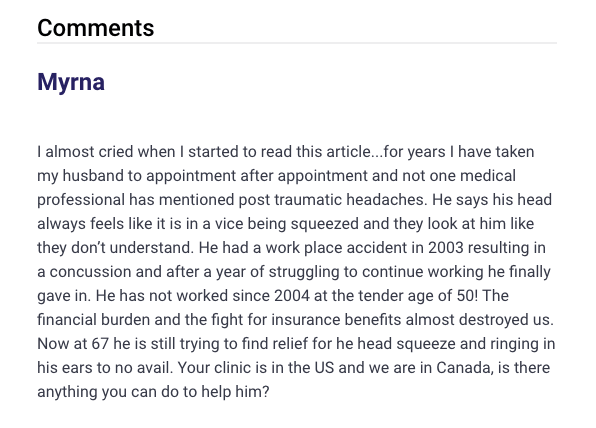
“I almost cried when I started to read this article.”
Again, had Olivia tried to self-research this topic, there’s no way that she would have been able to understand and share the nuanced ways in which post-concussion patients describe their headaches.
These details matter a lot in healthcare content writing, and the interview-based process we use at Grow and Convert is what allows us to translate these insights into content.
Now, let’s move onto a second key aspect of content writing: selling through your content in a considerate, compassionate way.
Challenge #2: Striking the Right Balance of Educating vs. Selling Compassionately Through Content
A key mistake that most businesses make when doing content marketing is that they don’t actually sell their products or services directly through their content. This is due to a misguided, long standing view that content is a top of funnel, strictly-educational marketing channel — not a channel for selling to readers for risk of turning them off. So blog content often only glancingly mentions their product or service (if it says anything about it at all). We disagree with this “don’t sell” approach, and we’ve long argued that it’s one of the key reasons why content fails to convert readers into customers for most businesses.
With that said, selling healthcare products and services through content requires finesse because people searching for information about health or medical issues are commonly in a vulnerable or worried state. They’re often looking to learn about or diagnose some problem they’re experiencing, and understandably healthcare businesses want to be respectful and careful about not coming off too salesy.
You can’t just push your product in the pieces as directly as you may with a less emotionally charged topic like business operations software or IT services.
This concern often leads healthcare companies to stay even further away from discussing their product or services through their content which is counterproductive to marketing goals. Content marketing is only effective insomuch as it reaches potential patients, drives lead generation, or acquires new patients or customers.
So, the ability to strike an appropriate balance with this is a second key challenge of doing content marketing for healthcare products and services.
At Grow and Convert, we navigate this first and foremost by focusing on topics (discussed more below) where it actually makes sense and would be appropriate to share about our client’s product or service. The basis of our approach still involves creating long-form, quality content pieces that thoroughly answer the queries of the reader on that particular topic. But in addition to that, the pain point and jobs to be done topics we focus on tend to offer natural, appropriate opportunities to include details of our client’s product or service.
Continuing with the example from above, let’s look at how we approach this.
Selling Cognitive FX Services Appropriately Through Content
The Article Introduction
In the introduction to the article, we share that the information discussed in the piece is based on Cognitive FX’s first-hand experiences treating concussion patients. This has a dual purpose.
On the one hand, it helps establish credibility in the eyes of readers. “Oh, these people treat concussions including concussion headaches. They’re speaking from first-hand experiences.”
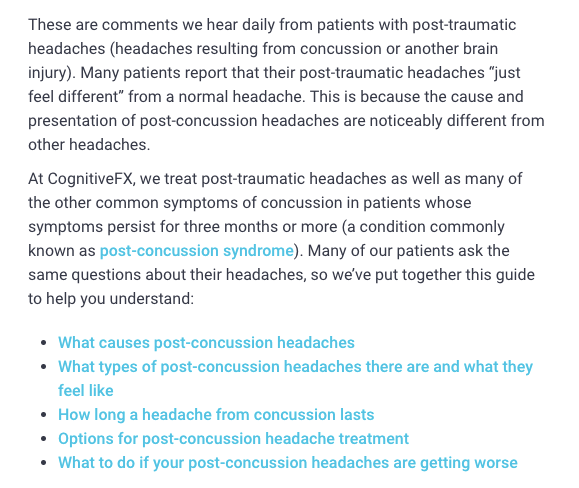
On the other hand, it explicitly states that Cognitive FX has a service to treat these symptoms, which, because of the intent of the keyword (i.e., “I have this problem”) is a perfectly reasonable thing to share, even right at the beginning of the article.
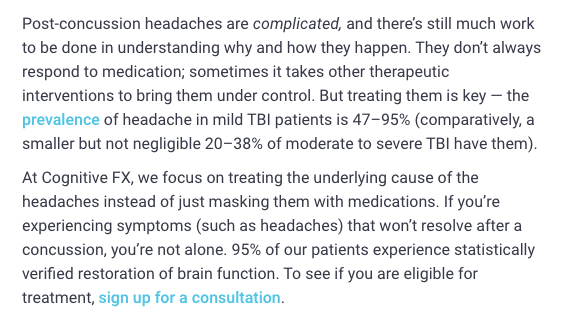
If we were targeting a broader keyword that didn’t signal that searchers had this pain point that Cognitive FX’s service solves, it probably wouldn’t have made sense or been appropriate to discuss their service in the introduction. But, by focusing on a pain point topic, it made a lot of sense.
Discussion of Treatment Options
After the introduction, the majority of the piece is educational, covering in detail the key topics and queries that searchers want to understand about their concussion headaches. Throughout, the level of unique detail continues working to build trust with readers. And, because treatment options are one of the subtopics that readers are interested in and wanting to understand, again the topic presents a natural opportunity and bridge into sharing about Cognitive FX’s service.
In the post, Olivia sets this up by first discussing some of the key misconceptions about treating concussions and headache symptoms, which directly relates to the core differentiation and positioning of Cognitive FX’s service. Then, she concludes the article with an explanation about Cognitive FX’s approach of treating the root causes of concussion symptoms, versus the symptoms themselves.
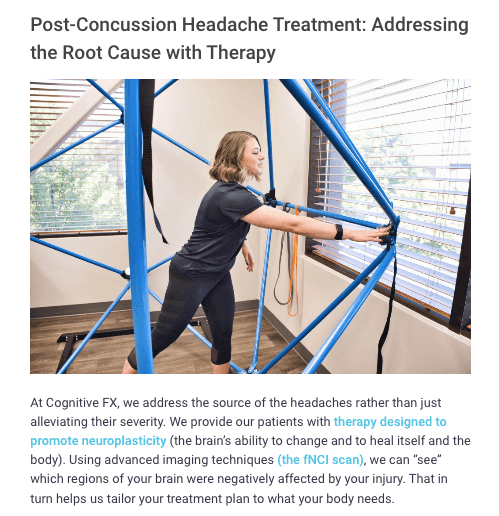
This is an approach that we’ve applied across all of the content we’ve produced for Cognitive FX. We don’t shy away from sharing about their service, and just cross our fingers that readers will appreciate the information provided and feel compelled to go digging into what their service offers. We share about their service in the post itself, including what makes it different and better than other treatment options, which is crucial for producing actual leads and new patients from our content.
Challenge #3: Identifying and Ranking for SEO Keywords That Will Result in New Patients or Customers
A final key challenge is understanding which SEO keywords to target that will drive high-quality leads and sustainable conversions from your content.
When it comes to keyword strategy, a key mistake that many healthcare brands make (as well as the marketing agencies and consultants that work with them) is that they focus their content creation around keywords that have the highest search volume. But as we’ve demonstrated many times before, this often isn’t the most effective approach if your objective is conversions or lead generation. Why?
Because high search volume keywords are, inevitably, broad, introductory level topics. For example, here is the broadest, most high volume keywords you can get in Cognitive FX’s space:

135,000 monthly searches is really tempting. But who is Googling “concussion”? Anyone!
- Students writing a paper on concussions
- Reporters getting background info on concussions
- Anyone having any conversation about concussions and stopping to learn more
Could some of the people Googling “concussion” be a potential customer of Cognitive FX? Sure, but in our experience measuring conversion rates, it’s likely a tiny, tiny fraction.
Do you want to go through the massive content marketing effort needed to rank in the top 5 of that keyword only to risk potentially never ranking and even if you do, converting only a tiny percent of those visitors into leads or sales? We don’t.
If you want to build a healthcare content marketing strategy that is focused on business results (i.e., conversions), then you need to prioritize your blog post topics and SEO keywords by conversion intent instead of search volume. That requires knowing the real pain points of a company’s ideal customer.
Of course, if a particular keyword is pain point based, has conversion or buying intent, and has high search volume, by all means go after it. But it’s a matter of prioritizing content ideas based on conversion intent first, then search volume second.
For the full discussion on this, you can read our original Pain Point SEO article here, or our accompanying article on content ideation.
Now, let’s look at some examples of specific types of keywords we targeted for Cognitive FX.
Conversion-Focused Keywords We Targeted and Types of Content We Prioritized for Cognitive FX
As per our Pain Point SEO framework, the solution for solving the keyword problems mentioned above is to target high buying intent keywords which usually come in three buckets:
- Category keywords
- Competitor and alternatives keywords
- Jobs to be done keywords
The content strategy that we’ve executed for CFX has consisted of 2 of those 3 keyword categories as well as patient stories:
- Pain point related posts (targeting pain point or Jobs to Be Done keywords)
- Direct service-related keywords
- Patient stories
Let’s look at an example of each.
Pain Point Keyword: Post-Concussion Headaches (Cont. From Above)
On why we chose “post-concussion headaches” as a topic to begin with: From our discussions with the doctors at Cognitive FX, we learned that headaches were one of the most common recurring, long lasting symptoms of a concussion. Many patients that Cognitive FX treats have had these for years and as we state in the intro of this post, they feel different than normal headaches.
Curiously enough, the search term “what does a concussion headache feel like” gets 1600 monthly searches (according to Ahrefs) so it felt like a great fit with their ideal patient profile.
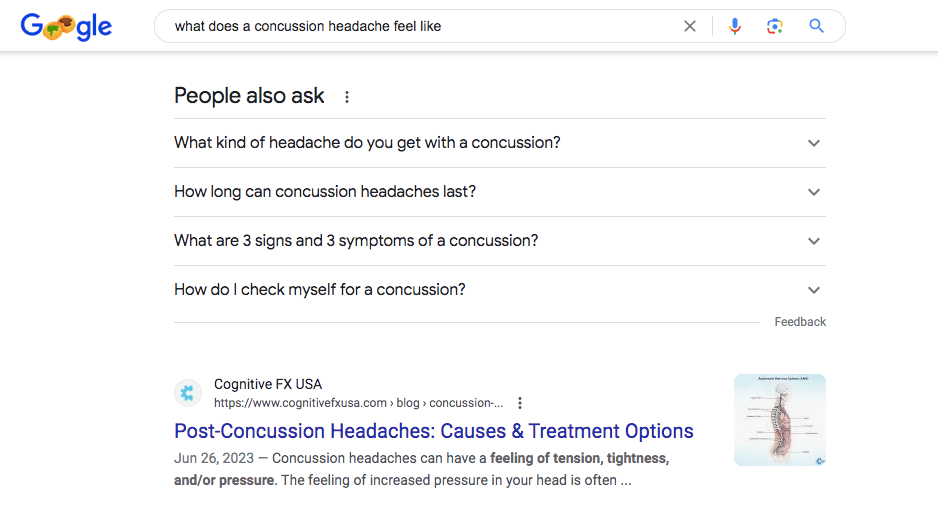
As of this writing (2023) we rank #2 for that term, ahead of the Mayo Clinic and the CDC.
Furthermore, just in the first year of being published, that single post brought in 32 leads — defined for Cognitive FX as a consultation request form fill for their service, which costs $13,000 for a week of in-person treatment at their center in Utah.

To put that in perspective, that’s equal to 4% of the leads they got from their homepage in that same time span, from a single blog post. That’s a lot from a single blog post! Many companies’ entire blogs don’t generate that percentage of attributable leads.
Direct Service-Related Buying Keyword: Best Concussion Clinics
For almost every business we’ve worked with, there are a handful of even higher intent keywords than the pain point based ones: direct product or service related keywords.
People interested in these topics have the highest possible intent in that they are literally Googling for the best option for the known solution.
For Cognitive FX, this includes terms like “best concussion clinic”, which we targeted with a blog post: How to Find the Best Concussion Clinics Near You.

At the time of this writing (2023), we rank #1 for that term.
Patient Stories: Figure Skating Concussions
Cognitive FX’s customer stories are amazing and a content strategy that didn’t incorporate them would have been a shame. And we knew it would have some value in their social media marketing.
The most amazing story we wrote for them was that of our own Grow and Convert content strategist, Olivia Seitz, who during the course of being the content strategist for Cognitive FX thought “Hmm, maybe some of the symptoms I’ve been dealing with for years could be related to a concussion or TBI (traumatic brain injury)”, talked to the Cognitive FX team, decided to give it a shot, got treatment for a week in Utah, and had an amazing transformation herself:

These stories are not SEO motivated, so it’s not essential that they rank, but some still do. The story above, for example, sits in position #2 for “figure skating concussion”:
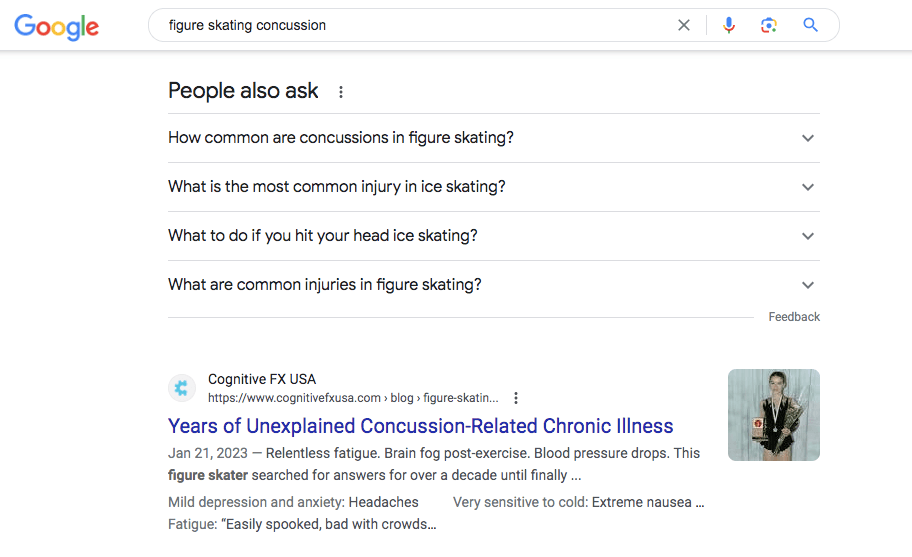
So, if you do customer stories like this, it can be helpful to pair them with some SEO keywords, even if they are lower in search volume. We typically do this after the story is conceptualized. Telling a great story takes precedence over what search engines want.
Results of Our Work With Cognitive FX
Ultimately, our work for Cognitive FX has resulted in 200,000+ page views per month, 180+ page one search engine rankings, and has grown to produce over 50% of all leads on their site.
Read an in-depth case study that dives deeper into our work with Cognitive FX here.
Closing Thoughts: A Key Lesson & Challenge of Healthcare Content Marketing in 2023
One key takeaway from our work with multiple healthcare providers and product companies is that, compared to other industries where ranking in search results is a relatively even playing field, Google and other search engines tend to heavily favor certain web domains when it comes to ranking for keywords in the healthcare space.
This presents a unique challenge for companies that want to do healthcare content marketing — one that has only gotten more difficult with recent search engine algorithm updates.
In our experience, even when we’ve produced a far better and more in depth article than, say, Mayo Clinic has on a particular topic, it can sometimes be difficult to outrank them simply because Google has evolved to heavily favor their domain.
With that said, there are still many cases in which, using the strategy and approach we laid out throughout this post, we’ve been able to beat those heavily favored domains for high intent keywords that are highly valuable to our clients. And, when we haven’t, we’ve often been able to rank just beneath those favored domains, giving our clients a leg up on their competitors which are also trying to rank for those keywords.
Learn More About Our SEO and Content Marketing Agency
- Our Agency: If you want to hire us to execute a content-focused SEO strategy built around driving lead generation and sales, not just traffic, you can learn more about working with us here.
- Join Our Content Marketing Team: If you’re a content marketer or writer and would love to do content marketing in this way, we’d love to have you apply to join our team.
- Our Content Marketing Course: Individuals looking to learn our agency’s content strategy and become better marketers, consultants, or business owners can join our private course and community, taught via case studies, and presented in both written and video content formats. We include several details and examples not found on this blog. Our course is also built into a community, so people ask questions, start discussions, and share their work in the lesson pages themselves, and we, along with other members, give feedback. Learn more here.


